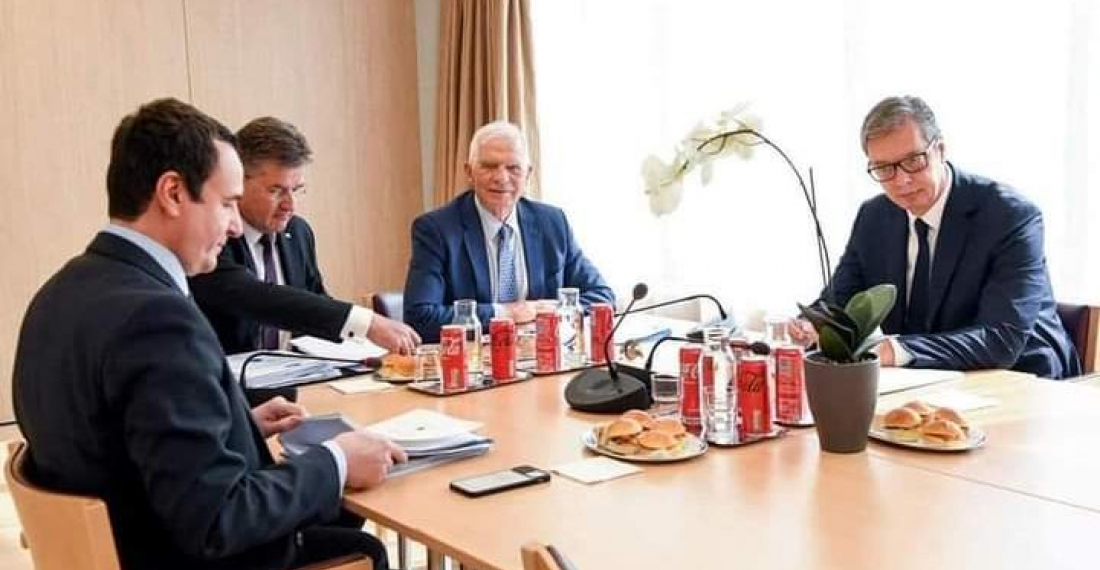High level talks between Serbia and Kosovo, facilitated by the European Union, have failed to unblock the impasse between them. EU High Representative Josep Borrell hosted the talks between Serbian President Aleksandar Vučić and Kosovo Prime Minister Albin Kurti in Belgrade on Thursday, 18 August.
Kosovo declared independence unilaterally from Serbia in 2008, after a long period of tension with Belgrade which had already emerged during the time of Yugoslavia.
Serbia still considers Kosovo an integral part of its territory. Around a hundred countries, including most EU member states, recognise Kosovo's independence.
Kosovo has a population of 1.8 million population, which is 90% ethnic Albanian. However 5% are Serbs, and it is the rights of this community that are the present stumbling block, but it is also recognised that differences are more substantial and wide-ranging.
A clearly disappointed EU High Representative told the media after the event that the immediate objective of the talks had failed, but that both sides agreed to keep talking.
Josep Borrell said:
Today, I hosted here in Brussels President Aleksandar Vučić from Serbia and Prime Minister Albin Kurti of Kosovo. This was the third High-level Meeting of the Dialogue looking for the normalisation of relations between Kosovo and Serbia.
Let me say that today’s meeting was not a normal meeting. It was not a regular meeting.
Together with the [EU] Special Representative Miroslav Lajčák, whom I want to thank [for] the good work, we called this meeting because we are facing very negative developments on the ground and increasing tensions in north Kosovo.
We can say that this meeting was about the responsibility of both leaders to look for solutions in good faith, to ensure that peace and stability prevail in this part of Kosovo – in north Kosovo.
And this happens at a moment where we are at a critical time for [the region] and Europe. We see the return of war to our continent after the Russian invasion of Ukraine. We are facing a dramatic and very dangerous moment for our continent. And this is not a moment for increasing tensions – it is time to look for solutions and to solve long outstanding issues.
As I said to the two leaders, this was a meeting in a crisis-management mode. It was a crisis management meeting, it was not an ordinary meeting. And the purpose of this meeting was to calm down the situation on the ground.
On the other hand, we also focused on the way forward on the comprehensive normalisation between Kosovo and Serbia.
Both leaders had the opportunity to talk – in detail - about this comprehensive agreement [on normalisation of relations], as the current tensions on the ground are symptoms of the broader issue of the unresolved status of their relations. What is happening is a symptom. Today it is happening there, tomorrow it may happen somewhere else because there is an underlying problem.
I think that both President Vučić and Prime Minister Kurti understood that there is not an alternative to the [EU-facilitated] Dialogue in order to solve this problem.
There are, certainly, well-known differences among them on their view about what will be the final the status of relations between Kosovo and Serbia, what this should be. But they agreed to continue discussions on a regular basis in the coming period to take the normalisation process quickly forward.
And I will have this very high on my agenda, with the special support of the Special Representative of the European Union, Miroslav Lajčák.
The current issues were the most pressing points in our agenda. We are witnessing recent tensions over licence plates and entry/exit documents for the people travelling between Kosovo and Serbia.
The International Community does not want to see renewed tensions in the coming period, and the Parties will be fully responsible for any escalation on the ground.
And unfortunately, we did not yet [come] to an agreement today. But it is not the end of the story. Both leaders agreed that the process needs to continue, and the discussions will resume in the coming days. There is still time until 1 September. I do not give up.
Today, there is not an agreement, but we do not give up. We need to continue discussing, we need to look for a solution. The process will continue.
And, in closing the meeting, I made also clear to both leaders that the European Union accession should remain their ultimate objective, one to which they have both committed. And for this, they need to find a way to advance on this path - and the first step of this way is to look for a solution to the current situation.
It has been a long day of meetings, and I think that the most important outcome is to say that we agreed that we have to continue working jointly, in a politically intelligent and responsible manner, looking for a comprehensive and mutually agreeable solution in a situation that is creating insecurity and instability first and foremost for the citizens of the region, but also for Europe as a whole.
It is our responsibility and our duty to continue working in order to look for a solution that, unfortunately, today has not been possible.







